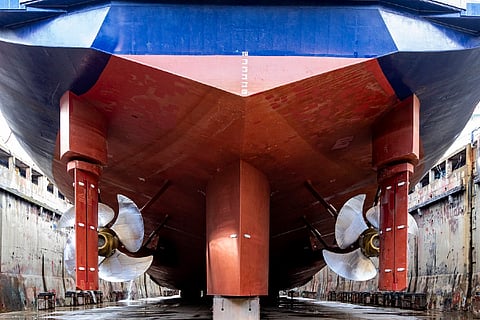

The global warming/climate change scare is certainly having a very significant effect on the overall maritime market and not least with respect to marine engines and propulsion systems.
Even without the scare, it was becoming obvious to all thinking mariners that the world needs to care for our environment much, much better. Noxious emissions, in particular, must be substantially reduced, if not eliminated. Fuel economy must be dramatically improved and adverse effects to wildlife, marine plants, and the seabed reduced.
Thus, we are not only seeing significant improvements to traditional diesel engines in terms of all the above requirements but, almost every day, we learn of experiments with or the introduction of new fuels. We also see the increasing use of electric propulsion in places such as Scandinavia and France, where cleanly generated electricity is economically available. We see LNG being used much more widely and hear of proposals for the use of hydrogen and other gases for fuel. Many countries are experimenting with such developments and some have achieved success. Even good old, well-meaning IMO has almost caught up and is implementing new emission reduction rules.
Of course, as has happened previously when concerns such as oil shortages or environmental degradation have been raised, we have had the usual offers of not very practical solutions like wind or solar-powered boats. Despite innumerable attempts and experiments, we are not aware of any being successful or even viable in the commercial or military sense.
Having travelled on several electric powered boats, I have to say I like their silence and cleanliness. They are fine, as mentioned, when their electricity is generated from reliable renewables such as hydro-electricity or nuclear but those sources are not widely available. So, if the electricity has to be generated by burning coal, the electric power exercise is pointless and we would be better sticking with diesel or LNG. At this stage, therefore, we can forget electric propulsion in most of Africa, Latin America, Southern Europe, Asia, Australia and Oceania – in other words, in most of the world.
Hence, in reality, we need to concentrate on wringing efficiency improvements and emission reductions from existing diesel technology or developments of it. That, fortunately, is happening both continually and rapidly as can be seen from our MEPS Week feature. Of course, where electricity is generated from renewables or nuclear, electric propulsion is viable and electric propulsion systems and their associated battery storage are improving seemingly daily. This is very encouraging.
Together with the actual generation of power, we are seeing dramatic improvements in how it is applied to actual propulsion through the sea. Propellers, waterjets, outboard motors, stern drives, ASDs, surface piercing drives, IPSs and every other imaginable kind of propulsion system are constantly being developed and improved.
The following pages offer an overview of what is happening in this field, which is of such vital importance to all mariners.
"The builder has emphasised that, even with its already innovative technology, the ferry will merely be the first in a series of locally-built passenger vessels that will operate on the same principle of wave-assisted propulsion."
"Further electrification will be the future and we are fully focusing on further development of our electric thrusters."
– "The engines offer a cleaner engine without compromising on power, and up to 25 dB noise reduction."
– "Calculations done in the system will also ensure that the charging power is adjusted to transfer only the needed energy."
– "European survey suggests that proposed greenhouse gas regulations could reduce global ferry passenger and freight capacity by more than 50 per cent as early as 2023."
– "As the technology becomes more widespread, we then can expect to see economies of scale drive costs down further."
– by Hieronymus Bosch, anonymous commentator and Baird Maritime's insider in the world of offshore oil and gas operations
– "The TCT series is specifically optimized for Tier III operation, and suitable for both conventional and dual-fueled, two- and four-stroke engines in both marine and power applications."
Remember to come back every day to see the latest news, opinion and vessel reviews!
Any news or views about the global engines and propulsion systems sectors? Send it through to editor@baird.com.au ASAP (between now and May 14), so we can add it to this current edition of MEPS Week!
We are after:
Sign up here to be notified in advance about future Marine Engines and Propulsion Systems Weeks.
Subscribe
